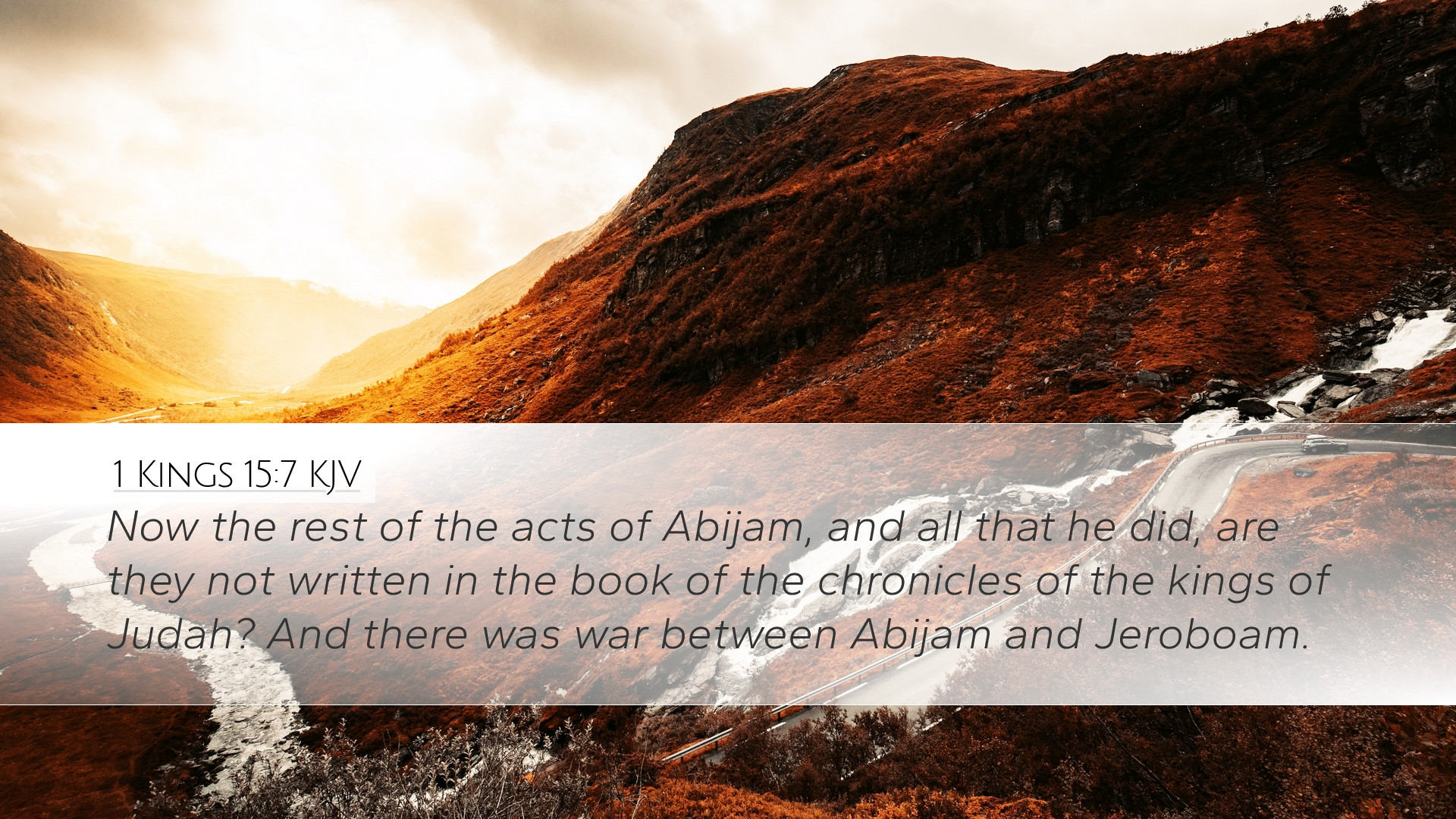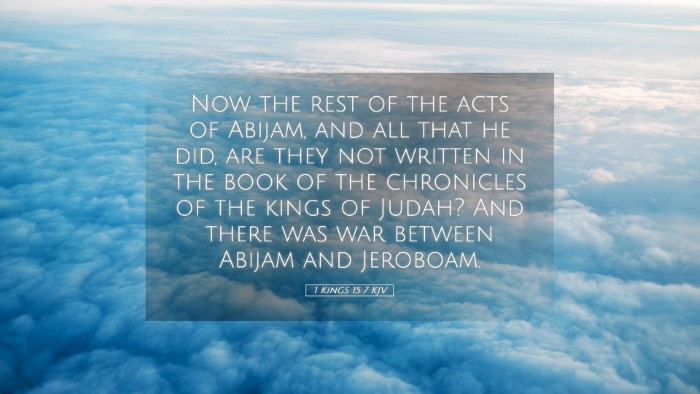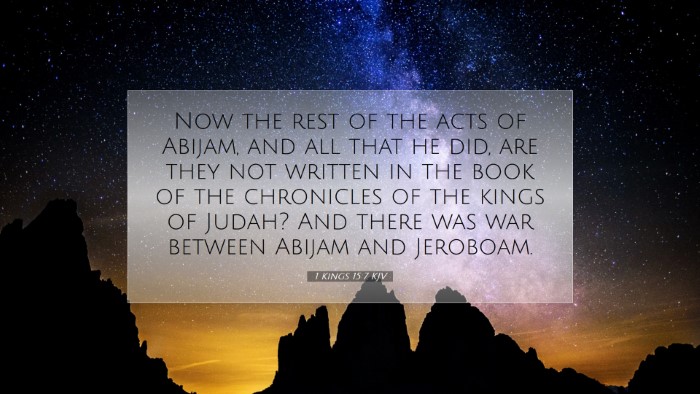Commentary on 1 Kings 15:7
Verse: "Now the rest of the acts of Abijam, and all that he did, are they not written in the book of the chronicles of the kings of Judah? And there was war between Abijam and Jeroboam."
Introduction
This verse serves as a pivotal narrative transition in the account of the kings of Judah, particularly concerning Abijam, the son of Rehoboam and the grandson of Solomon. The brevity of the verse invites deeper reflection on the implications of historical documentation and the theological message present in the themes of conflict and divine oversight.
Historical Context
To understand 1 Kings 15:7, one must consider the historical timeline it occupies. Abijam's reign (approximately 913-911 BC) occurred during a tumultuous period marked by the division of Israel into the Northern Kingdom (Israel) under Jeroboam and the Southern Kingdom (Judah) under the Davidic line. This state of division is crucial for grasping the context of the conflicts that followed and the record's importance in divine providence.
Commentary Insights
-
Matthew Henry's Commentary:
Henry notes that while the text provides a concise account of Abijam’s reign, it emphasizes the spiritual decline present in Judah during his rule. Despite being a descendant of David, Abijam continued in the ways of his father Rehoboam, particularly in his acceptance of polytheism and idol worship. Henry highlights the importance of evaluating kings not just by their political achievements but also by their fidelity to God. He states that the record of Abijam's actions confirms that divine judgment and mercy are continually at work in the lives of leaders and nations.
-
Albert Barnes' Commentary:
Barnes focuses on the reference to the "book of the chronicles of the kings of Judah." He suggests that this phrase invites readers to seek more comprehensive accounts in other biblical records, which would provide a fuller understanding of Abijam's reign and character. Barnes also stresses the enduring theme of conflict between Abijam and Jeroboam, highlighting it as not merely a political skirmish but as a contest rooted in the covenantal faithfulness of God to His people. This thematic conflict illustrates God's continued involvement in the affairs of nations, affirming His sovereignty even amidst human failings.
-
Adam Clarke's Commentary:
Clarke takes a historical-critical approach, examining the details surrounding the conflict between Abijam and Jeroboam. He remarks that the war signifies not just a power struggle but a larger narrative of God's providence in the face of human disobedience. Clarke discusses the inconsistency of Abijam's character, as he was not a king of exemplary virtue yet engaged in battle against Jeroboam, which emphasizes the complexities of leadership in Israelite history. Clarke points out that this conflict is emblematic of a larger spiritual warfare that occurs throughout the biblical narrative.
Theological Themes
The brief nature of 1 Kings 15:7 encourages the reader to reflect on several essential theological themes:
-
Legacy of Leadership:
This verse underscores the importance of legacy within leadership roles. Abijam, despite his failings, is still part of the Davidic line, which carries significant theological implications regarding Christ’s lineage. The connection between faithfulness to God and the effectiveness of leadership is crucial for contemporary church leaders.
-
Divine Sovereignty and Human Agency:
The ongoing conflict between Abijam and Jeroboam can be seen as illustrative of God’s overarching sovereignty. Even when leaders fail to uphold righteousness, God is still at work to preserve His covenant people. This theme can serve as encouragement to those in ministry, reminding them that God's purposes will prevail despite human shortcomings.
-
Historical Documentation and Integrity:
The mention of other historical chronicles serves as a reminder of the importance of historical integrity in biblical narratives. This encourages diligent scholarship and exploration beyond surface-level reading, urging theologians and students to seek deeper insights in the scriptures and their surrounding contexts.
-
Conflict as a Theological Motif:
The war between Abijam and Jeroboam reflects the larger conflict between faithfulness to God and rebellion against His will. This motif has implications for understanding spiritual warfare in a contemporary context, challenging believers to recognize the ongoing struggles against spiritual forces in their lives.
Conclusion
1 Kings 15:7 encapsulates a period of historical significance while embedding profound theological truths relevant for modern-day readers. Through the lens of various public domain commentaries, one can appreciate the multifaceted nature of this passage, guiding pastors, students, and scholars toward a deeper understanding of God's sovereign work amidst the complexities of human leadership and the reality of spiritual conflict. The accounts surrounding Abijam challenge contemporary leaders to reflect on their faithfulness and the legacy they will leave in their stewardship, ultimately pointing to the redemptive narrative fulfilled in Christ.


